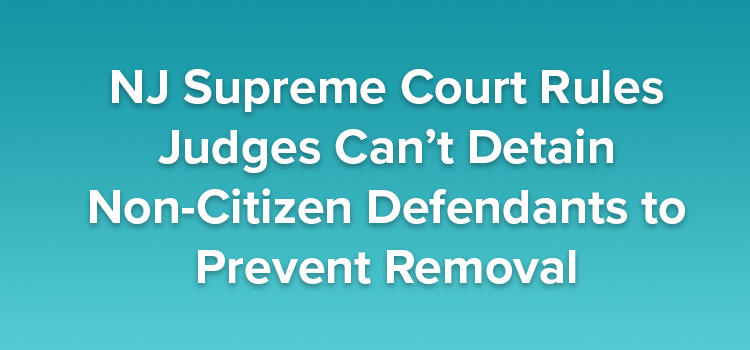
In State v. Lopez-Carrera (A-8-20/084750) and State v. Molchor; State v. Rios (A-9-20/084694) (Decided March 30, 2021), the Supreme Court of New Jersey held that the Criminal Justice Reform Act (CJRA) does not empower judges to detain defendants who are non-citizens to prevent immigration officials from removing them from the country before trial.
Facts of the Cases
Defendants Juan Molchor and Jose Rios were arrested and charged with aggravated assault and criminal mischief after allegedly punching and striking an acquaintance over the head with beer bottles at a party and damaging two cars as they left. Pretrial Services prepared Public Safety Assessments (PSAs) for both defendants. The PSAs rated both defendants 1 out of 6 for failure to appear, the lowest level of risk, and 2 out of 6 for new criminal activity. Pretrial Services recommended that both be released with monthly reporting.
The State moved for pretrial detention, claiming defendants posed a flight risk because they were undocumented immigrants. The State presented no evidence that U.S. Immigration and Customs Enforcement (ICE) was interested in either defendant. The court ordered both defendants detained pretrial, noting that, but for their immigration status, both would likely have been released. In both detention orders, the court included a single finding to justify detention: “Particular circumstances, specifically, defendant is an illegal alien.” The Appellate Division consolidated the cases and reversed.
Defendant Oscar Lopez-Carrera was charged with attempted sexual assault and criminal sexual contact in relation to an alleged attempted sexual assault of a minor. He had no prior convictions or other pending charges, and no prior failures to appear. The PSA rated him at the lowest level of risk, 1 out of 6, for both failure to appear and new criminal activity. Pretrial Services recommended that Lopez-Carrera be released on his own recognizance. Immediately upon his release, ICE officials took him into federal custody. He was indicted months later. Eight months after that, ICE informed prosecutors of the following: Lopez-Carrera was the subject of a final removal order; his immigration appeals had been denied; and he would be removed from the country to Guatemala. In his immigration appeal, Lopez-Carrera unsuccessfully sought a continuance to allow his criminal charges to be resolved.
The State promptly moved to revoke Lopez-Carrera’s pretrial release based on the change in circumstances. The trial court denied the motion, relying on the Appellate Division’s recently published decision in Molchor. The Appellate Division affirmed. The State contacted ICE and asked for permission to apply for deferred action or an administrative
stay of removal to delay Lopez-Carrera’s removal from the country. Counsel for ICE responded that the removal could not be delayed. Although Lopez-Carrera was removed from the United States to Guatemala, the New Jersey Supreme Court agreed to hear his appeal because it raises an issue of significant public importance that is likely to recur.
NJ Supreme Court’s Decision
The New Jersey Supreme Court affirmed. “We agree with the Appellate Division that the language of the Act, coupled with its history, does not authorize judges to detain defendants to thwart their possible removal by ICE,” Chief Justice Stuart Rabner wrote.
While the Court acknowledged that the CJRA does not directly answer the question, and the Legislature did not debate the issue, it found that “the language, structure, purpose, and history of the CJRA reveal the Act was designed to address a defendant’s own choice not to appear in court, not independent actions by third parties like [ICE].”
In support, the court noted that the CJRA favors release with conditions, with detention reserved for defendants who pose a significant risk of non-appearance, danger, or obstruction. It also emphasized that the language, structure, and purpose of the CJRA support the conclusion that the Legislature intended to authorize pretrial detention when there is clear and convincing evidence that individual defendants pose a serious risk of non-appearance based on their own conduct, not the acts of third parties like ICE.
While the court acknowledged that ties to another country can inform a court’s decision regarding a defendant’s risk of nonappearance, it concluded that a person’s immigration status alone cannot be dispositive. “A person’s immigration status alone cannot be dispositive,” Justice Rabner wrote. “Courts must engage in a fact-specific inquiry that looks beyond status because each person’s circumstances – citizens and non-citizens alike – are different. Non-citizens who have lived here for years, gone to school here, raised families here, and established roots in their communities may pose only a minimal risk of non-appearance.”
